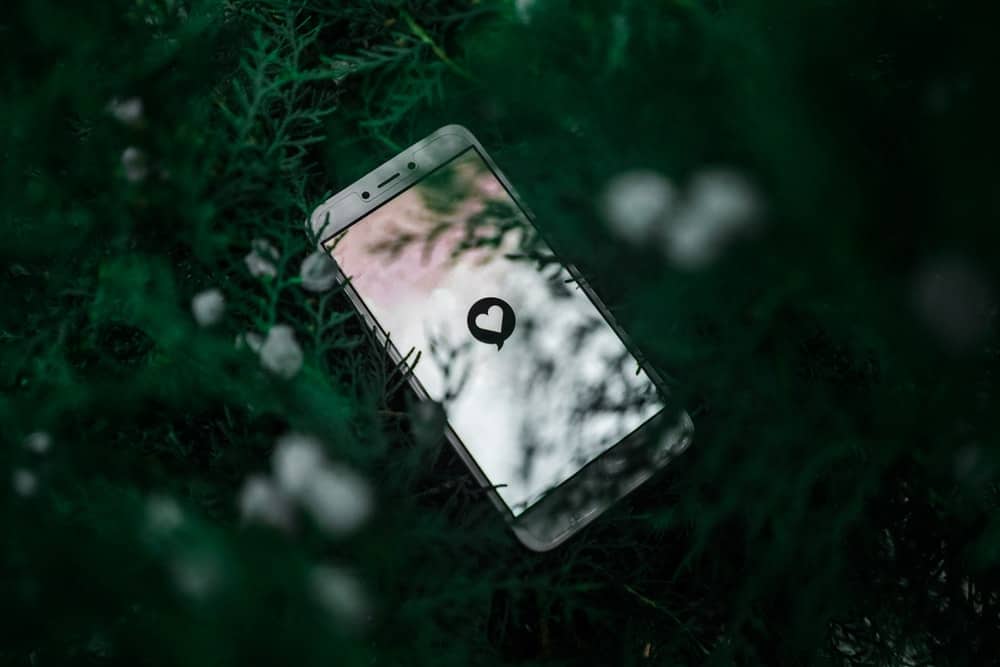- Have you ever noticed that an old flame keeps liking all your photos or watching all your stories?
- Despite clearly keeping tabs on your life, are they still hardly ever replying to your messages and never asking to meet up?
- If so, there’s a word for what you’re going through: orbiting

Online dating is a minefield.
As if it wasn’t hard enough to grapple with issues like ghosting, cushioning, and benching, there’s another new trend that’s sweeping the dating scene: orbiting.
What is orbiting?
The term ‘orbiting’ was coined by Anna Iovine back in 2018. It’s defined by Urban Dictionary as “when someone who won’t speak to you otherwise still watches every snap on your story and/or likes your posts. Usually someone who has ghosted you, but not always. Basically they’re lingering in your life despite refusing to be an active part in it in any other capacity.”

Why is it called ‘orbiting’? Iovine writes: “I dubbed it “orbiting” during a conversation with my colleague Kara […] She poetically described this phenomenon as a former suitor “keeping you in their orbit” – close enough to see each other; far enough to never talk.”
So, if your texts have gone unanswered, but if they never hesitate to like your selfies and they’re always the first person to watch your story, that means you’re being orbited.
Why do people do it?
One possibility is that this person regrets the fact that things fizzled out between you and they’re obsessively stalking your social media profiles because they miss you. “When you’re still liking somebody else’s stuff, you’re staying attached,” relationship expert and psychotherapist Lisa Brateman tells Men’s Health. “You’re sending a message that you’re still seeing into the other person’s life.” In other words, by interacting with your social media content, your orbiter is effectively saying “don’t forget me!”

If things between you ended abruptly, your orbiter might also be looking to your social media for answers. “There’s always unanswered questions [at the end of a relationship],” Brateman explains. “There’s always things you don’t know that people use social media to seek. They look to social media for information, for signs.”
It makes sense – if you’ve been ghosted or inexplicably dumped yourself, you might be left wondering why. Did something happen? Did they get a new partner? Move away? Lurking on their social media profiles is sometimes the only way to get answers, so it makes sense that people orbit.
Things are more complicated if they’re the one that broke things off. If someone isn’t replying to your messages and isn’t bothered about planning when they’re next going to see you, then why are they still keeping tabs on your social media?
Writing for eHarmony, Verity Hogan suggests that your orbiter “might want to keep their options open and don’t mind if they’re sending mixed signals.”

“Narcissistic types may enjoy the power they feel from maintaining a digital foothold in your life,” she explains. “It appears passive, but even though they’re not texting or calling you, orbiting exes can pop in and out of your life whenever they want. Even if you’re completely over them – or if your relationship never even got off the ground in the first place – you’ll likely feel a twinge every time their name appears on your phone. It’s inevitable.”
What to do if you’re the orbiter
If you’re the one who’s liking their photos, retweeting their tweets and viewing their stories, you may need to reevaluate your actions. It’s important to note that if both of you have moved on and are on friendly terms, engaging with their social media content isn’t a bad thing at all – it’s normal, even. But if both or either of you really aren’t over the relationship, you can’t go on lurking on all their digital profiles.

If you’re the one who ended things and you’re not keen to date the other person at the moment, ask yourself if what you’re doing is fair. “Digital media has made keeping backup mates really easy,” psychologist Wendy Walsh tells Men’s Health. But just because it’s easy, keeping someone on the back burner isn’t right. If you’re engaging with their posts knowing that they’ll think about you when they see your name pop up in a notification, you need to stop what you’re doing for their sake.
Writing for Men’s Health, Sofia Barrett-Ibarria suggests soft-blocking or muting the person you’re orbiting: “to avoid confusing your ex or hurting their feelings, you should at the very least mute their timeline for a few months and avoid interacting with their content, even if you don’t want to take the drastic step of unfollowing.”
She goes on to make the valuable point that you have to be sensitive when interacting with an ex on social media, even if your relationship was brief. “Social media is a public space where real-life breakup etiquette rules still apply,” she says. “If you wouldn’t call up your ex IRL and tell them they looked hot in their recent vacation photos, you probably shouldn’t implicitly tell them that on Facebook or Instagram by liking their content.”

What to do if you’re being orbited
If you’re the one being orbited, it’s not necessarily a bad thing. You might have truly moved on and simply don’t care if your ex keeps engaging with your social media. “If you’re in the orbit of people that don’t hold any emotional weight in your life anymore, then you could argue it’s harmless,” Hogan writes. “Your stories, tweets and posts are intended to be public after all. It might even be nice seeing a familiar name pop up every now and again. A welcome dose of nostalgia.”
Still, if you are bothered by your ex’s name repeatedly popping up in your phone, then you certainly aren’t alone. Hogan suggests blocking offending accounts if orbiting is really getting you down: “The best thing to do is cut it off completely. Reach for the block button and don’t look back.”

She continues: “It’s hard to let go of that ego boost or to say goodbye to a past relationship for good. But remember, if your ex really regretted their actions and wanted to make amends, they’d do more than lurk on your Facebook page. Don’t take them seriously unless they call, message, or attempt to arrange a meet up in person.”

